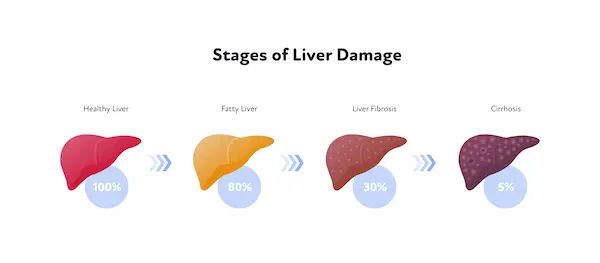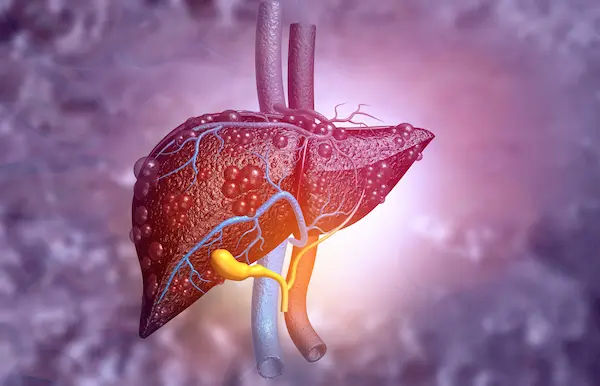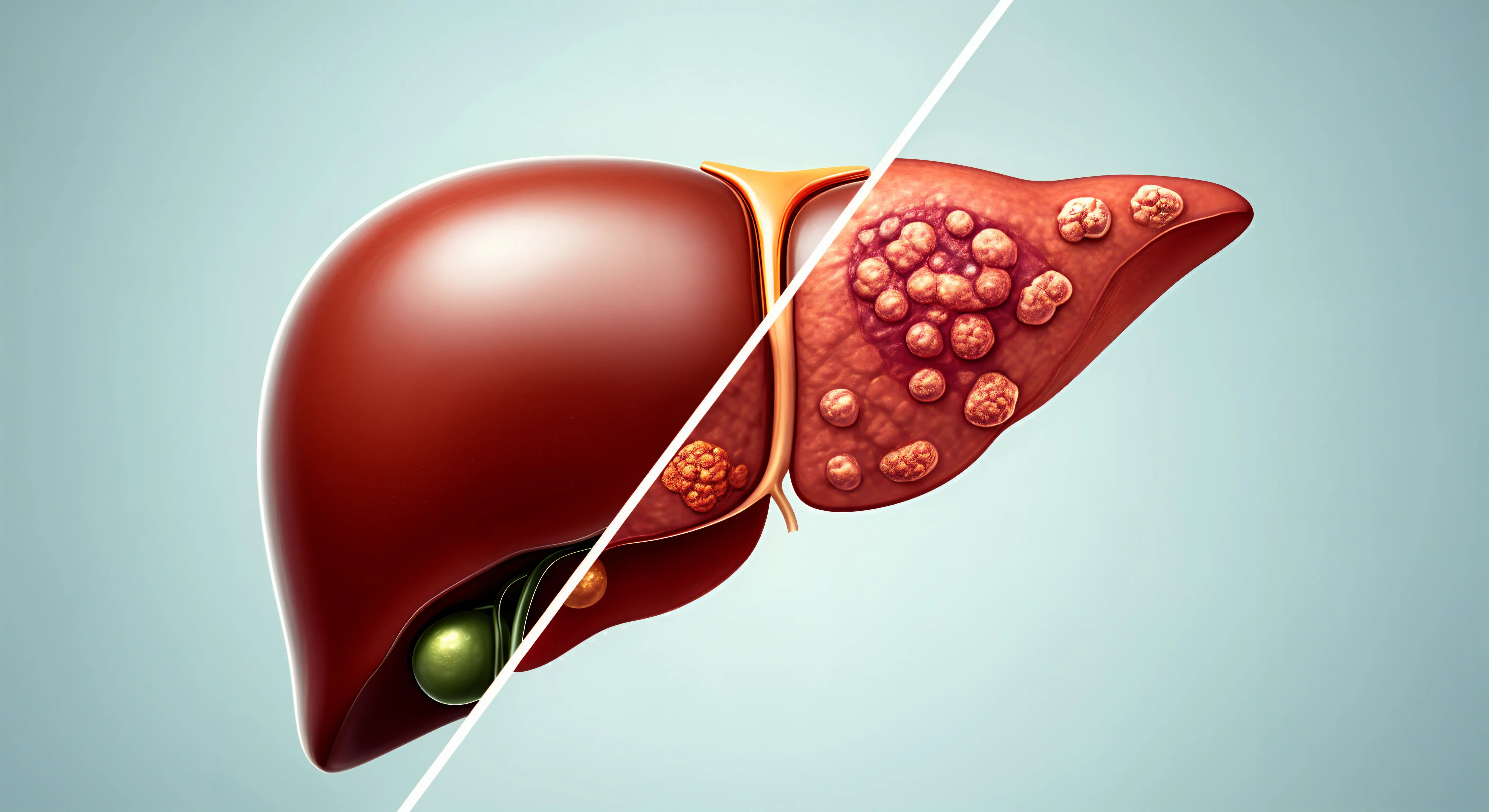How to Reduce SGOT Quickly: Diet, Lifestyle & More
High levels of SGOT in the liver can cause severe issues like cirrhosis, liver cancer, diabetes, kidney damage, etc. Read on to learn the causes of high SGOT levels and ways to reduce them.

Written by
Last updated on 13th Jan, 2026
SGOT, also termed serum glutamic-oxaloacetic transaminase, is an enzyme which is mainly produced within the liver, with minute traces in the heart, kidneys, brain, and muscles. Generally, the SGOT value ranges between 5 to 40 units per litre and tends to differ slightly based on factors like age group, medical illness, gender, and other factors.
However, if the level is too high from the normal range, it indicates serious health conditions like fatty liver, hepatitis, cirrhosis and more. Read on to learn the effective ways to reduce SGOT, including diet, lifestyle modifications, medical interventions and more.
What Causes High SGOT Levels?
Before learning about the ways to control SGOT, one must know about the factors that cause serum glutamic-oxaloacetic transaminase (SGOT). It will help one prevent SGOT and lead a healthy life. Here are some of the factors that cause high SGOT levels:\
Liver Conditions
Certain liver conditions, like hepatitis, cirrhosis, fatty livers, etc., can increase the SGOT levels in an individual. Hepatitis entails viral infections that lead to liver inflammation and high enzyme levels.
Fatty liver diseases are of two types: alcoholic (caused due to chronic drinking) and nonalcoholic (caused due to obesity). In both cases, the SGOT and serum glutamic pyruvic transaminase (SGPT) levels of the affected person get elevated.
Another liver condition that elevates the SGOT level is cirrhosis. It leads to chronic liver damage that can cause liver failure and scarring.
Muscle Injuries
Strenuous exercises can damage muscles and cause muscle trauma. This trauma increases liver enzymes, leading to higher SGOT levels. Another reason for high SGOT levels is muscular dystrophy. It is a genetic disorder that causes progressive weakness and muscle loss.
Heart Conditions
Cardiac conditions like heart failure and heart attacks can also lead to high SGOT levels in a person. During a heart attack, the muscles of one’s heart get damaged and release certain enzymes in the individual’s bloodstream, which elevate the SGOT levels. Chronic heart conditions like heart failure can also affect the enzyme levels in a person’s body, along with liver functions, leading to higher SGOT levels.
Dietary Changes to Lower SGOT
Making specific dietary choices can help lower the SGOT levels in an individual:
Foods to Include
To restore liver health, one should do the following:
Include green leafy vegetables, healthy fats, cereals, lean protein, whole grains, etc., in their diet. A balanced diet is the key to maintaining a healthy liver.
Vitamin D is another essential nutrient that lowers SGOT levels. Soy milk, mushrooms, oranges, oysters, eggs, dairy products, etc., are good sources of vitamin D.
Foods rich in antioxidants, like nuts, garlic, green tea, berries, etc., can also help regulate the SGOT levels.
Foods to Avoid
Processed foods, added sugars, and saturated fats can worsen the situation if someone has a high SGOT level. In this regard, one must avoid:
White bread snacks
Carbonated soda
Junk food items
Importance of Hydration
Water helps detoxify the liver naturally and improves one’s metabolism. Thus, one should stay hydrated to ensure the SGOT levels are under check.
Lifestyle Modifications to Improve SGOT Levels
Apart from diet, individuals should also focus on lifestyle habits to keep a check on their SGOT levels:
Regular Exercise
Physical inactivity leads to excessive fat accumulation in one's body, further increasing the risks of fatty liver and higher SGOT levels. To avoid this:
It is essential to workout at least an hour daily to improve liver health and keep the SGOT levels balanced.
Moderate physical activity, like walking, swimming, jogging, etc., is enough to keep the liver healthy.
Avoiding Alcohol and Smoking
Excessive alcohol consumption can cause inflammation of the liver, leading to cirrhosis or other severe health issues. Smoking can also damage liver function and increase the SGOT levels in an individual.
Thus, it is necessary to quit smoking and consuming alcohol to maintain liver health.
Stress Management Techniques
Chronic stress can impact liver function. To effectively reduce stress and support liver health, one must consider stress management techniques like:
Yoga
Meditation
Deep breathing exercises
Consult Top Hepatologist
Medical Interventions to Reduce SGOT Level
Sometimes, natural remedies alone cannot help reduce the SGOT levels effectively. Thus, medical interventions and professional assistance become essential:
Medications That Can Help
One can include certain supplements and antioxidants in the form of medicines to improve liver health. In this regard:
Medications improve the enzyme levels of one's liver, help in detoxification, and protect the cells in the liver from oxidative stress.
However, one should also limit overdose of antibiotics, painkillers, and other medicines to ensure regulated SGOT levels.
Role of Liver Function Tests
It is essential to get routine blood tests to check the liver functioning and monitor the liver enzymes to ensure the SGOT levels are under check. Apart from the standard tests, one should also consider going for:
Coagulation Test
The liver produces certain proteins that help in necessary blood clotting. However, excessive clotting can be dangerous for liver health. This test detects the disorders in clotting to keep a check on healthy liver function.
Bilirubin Test
Bilirubin level helps check if one has jaundice or not. Doctors suggest this test to check for liver diseases as well as liver health.
Imaging Test
Imaging tests like MRI, CT scan, and ultrasound need to be done depending on the clinical test reports. It will help detect any abnormalities in the liver structure.
Note: One should opt for these tests only upon the recommendation of a healthcare provider.
When to Seek Medical Advice?
If a person experiences any of the following symptoms, it is necessary to get professional medical assistance:
Pale coloured stool
Weight loss
Nausea
Pale or yellowish skin and eyes
Swelling and pain on the right side of the abdomen
Weakness
Loss of appetite
Dark yellow or reddish urine, etc.
Natural Remedies to Reduce SGOT Levels
SGOT levels can be improved by including the following herbs and antioxidants in one’s diet:
Green Tea
Green tea is rich in polyphenolic antioxidants that help improve metabolism and overall liver function.
Milk Thistle
Silybin, silydianin, and silychristin are compounds extracted from milk thistle that help reduce liver inflammation, liver cell regeneration, etc.
Licorice
This herb has anti-viral and anti-inflammatory medicinal properties to protect one’s liver health.
Ginseng
This herb is known for its antioxidant and anti-inflammatory properties. It protects the liver from toxins and reduces inflammation.
Note: One can consider adding these natural remedies in addition to the recommended medication.
Monitoring and Follow-up for a Regulated SGOT Level
Regular preventive health checkups are essential for monitoring liver health and detecting any abnormalities early:
These checkups include liver function tests and other assessments to evaluate overall health.
High SGOT levels may indicate cholestasis, cirrhosis, chronic hepatitis, liver cancer, etc. Thus, understanding SGOT test results is crucial for managing liver health.
Furthermore, one should seek assistance from a healthcare provider to interpret the results and develop a plan to address elevated levels.
Conclusion
Lowering SGOT levels involves a multifaceted approach. Dietary changes, like incorporating liver-friendly foods and avoiding processed items, are crucial. Lifestyle modifications such as regular exercise, avoiding alcohol and smoking, and managing stress significantly contribute to liver health.
Medical interventions and natural remedies can offer additional support. Regular monitoring and checkups are essential for tracking progress and maintaining optimal liver function.
Consult Top Hepatologist
Consult Top Hepatologist

Dr. Srinivasa Reddy
Hepatologist
12 Years • MBBS, MD (General Medicine), DM (Hepatology),ASGE
Hyderabad
Myra Liver & Gastro Care, Hyderabad

Dr. E Prabhakar Sastry
General Physician/ Internal Medicine Specialist
40 Years • MD(Internal Medicine)
Manikonda Jagir
Apollo Clinic, Manikonda, Manikonda Jagir
(150+ Patients)

Dr. Pukhraj Singh Jeji
Gastroenterology/gi Medicine Specialist
13 Years • MBBS, MD ( Internal Medicine ), DM ( Gastroenterology ), Consultant - Gastroenterology
Bhubaneswar
Apollo Hospitals Old Sainik School Road, Bhubaneswar

Dr. Aswin S. Krishna
Hepatologist
10 Years • MBBS, MD (Internal Medicine,MMC), DM (Hepatology, MMC), PDF(Fellowship in Liver Transplanatation)
Chennai
Apollo Hospitals Greams Road, Chennai
(125+ Patients)

Dr U V U Vamsidhar Reddy
Hepatologist
10 Years • MBBS, MD (JIPMER), DM (Hepatology, PGIMER)
Chennai
Apollo Hospitals Greams Road, Chennai
(75+ Patients)
Consult Top Hepatologist

Dr. Srinivasa Reddy
Hepatologist
12 Years • MBBS, MD (General Medicine), DM (Hepatology),ASGE
Hyderabad
Myra Liver & Gastro Care, Hyderabad

Dr. E Prabhakar Sastry
General Physician/ Internal Medicine Specialist
40 Years • MD(Internal Medicine)
Manikonda Jagir
Apollo Clinic, Manikonda, Manikonda Jagir
(150+ Patients)

Dr. Pukhraj Singh Jeji
Gastroenterology/gi Medicine Specialist
13 Years • MBBS, MD ( Internal Medicine ), DM ( Gastroenterology ), Consultant - Gastroenterology
Bhubaneswar
Apollo Hospitals Old Sainik School Road, Bhubaneswar

Dr. Aswin S. Krishna
Hepatologist
10 Years • MBBS, MD (Internal Medicine,MMC), DM (Hepatology, MMC), PDF(Fellowship in Liver Transplanatation)
Chennai
Apollo Hospitals Greams Road, Chennai
(125+ Patients)

Dr U V U Vamsidhar Reddy
Hepatologist
10 Years • MBBS, MD (JIPMER), DM (Hepatology, PGIMER)
Chennai
Apollo Hospitals Greams Road, Chennai
(75+ Patients)




